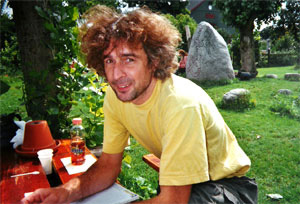Dope
and
Diplomacy
in
Dublin:
European
Union
Conference
Tries
to
Lay
Groundwork
for
Continental
Drug
Strategy
5/21/04
More than 200 European drug experts (and some international observers) gathered in Dublin, Ireland, on May 10 and 11 as part of the European Union's effort to develop a continental drug strategy for the next five years. The conference, "EU Strategy On Drugs – The Way Forward," was designed to "facilitate an exchange of ideas between all participants and to agree on conclusions and recommendations on the main elements of a future EU drugs strategy," according to the EU's Justice and Home Affairs council. But it didn't quite work out that way, according to Joep Oomen, who attended as an invited representative of ENCOD, the European NGO Council on Drugs (http://www.encod.org), an umbrella grouping of drug reform groups throughout Europe. Not only were no conclusions reached, Oomen reported, some governments reacted harshly to ENCOD's presence and the harm reduction and drug reform agenda it represented. Oomen participated in a plenary panel session early in the conference, where he broached the topic of ending the drug war. "I was the only panel member to propose a fundamental change of logic in drug policy by referring to the need to start creating political 'room for maneuver' for policies that are not based on prohibition," ENCOD's representative reported. That same plenary panel then viewed a video featuring drug reform activists and experts, including activists Andria Efthimiou-Mordaunt and Danny Kushlick from Britain and Jan van der Tas from the Netherlands, as well as British harm reductionist David Liddell. Academics featured in the video were Tomas Zabransky from the Czech Republic, Mike Trace from Britain, and Krzysztof Krajewski from Poland. All called on viewers "to work toward a review of existing policies," reported Oomen. That was a bit much for some of the more prohibitionist governments in attendance, who reacted vociferously during the panel's discussion period. "The first three governments to react – Belgium, Italy and Greece – immediately protested against my presence," Oomen wrote. "The Belgian government even used the word 'scandalized' to describe their feelings on my presentation and the content of the video, accusing the organizers of being extremely biased in their choice of speakers. They also felt scandalized by the fact that ENCOD had dared to use the EU symbol in our flyer" (http://www.encod.org/encod_lo-res.pdf).
This is an odd position, given that harm reduction is already part of official European Union drug policy. When it adopted the current action plan in June 2000 at the European Council of Santa Maria da Feira, the EU explicitly embraced harm reduction. "The plan notably refers to reducing the adverse consequences of drug use," explains the EU's Justice and Home Affairs Commission. "This means that harm-reduction measures such as needle-exchange programs or providing treatment as an alternative to imprisoning problem users are encouraged." The current EU drug strategy sets six main targets:
Although presentations were given by a number of drug experts, politicians, and police types, reported Oomen, there was little such talk in Dublin, at least not formally. Instead, there were many cries for more research (and more funding) and more international law enforcement cooperation. The relative sterility of the debate, said Oomen, was because Sweden, Italy, Belgium, France and Germany refused to enter into real discussion. "Their goal seemed mainly to sabotage the debate, to make sure no mention was made that would open the Pandora's box [of legalization]." That left "a bitter aftertaste" among participants, he noted. It was different in the hallways, said Oomen. "Meanwhile, several representatives came to me and said that on a personal title, they agreed with lots of the things we were saying. Especially the representatives of the new EU Member States were very positive, saying that they did not agree with the Belgian representative. They said that from own experience, they knew all too well how 'civil society' is treated by authorities and that the future is ours." Oomen also reported "positive talks" with Irish, Dutch, Slovenian, Czech, Finnish, Cypriote, Slovak, Bulgarian and Hungarian, European Commission and Council of Europe delegates, and "even a constructive conversation with someone from the Swedish Ministry of Justice, who also said that he found the drug debate too dogmatic." The 100 copies of the formal ENCOD statement to the conference were also quickly grabbed up, he said. "In personal conversations, one could feel however that even repressive governments (like Denmark and Sweden) do not have a real response to the argument that more law enforcement on drugs means more money to organized crime. They typically respond by saying that we do not have a proposal of how to do things in a post-prohibition system, and as long as we do not have answers to many questions on how such a system could function they will never take us seriously." And so it goes as the EU plods toward a new drug strategy. The EU 2005-2008 action plan on drugs must be designed by October for final approval in the spring of 2005. And ENCOD's Oomen remains optimistic despite the apparent rigidity in the halls of the EU. The action plan will include an evaluation of the current drug strategy, and the facts are not the side of the prohibitionists. "We already know that these will be favorable for our cause," Oomen told DRCNet. Read Oomen's complete report and the ENCOD Dublin presentation online at http://www.encod.org/reportdublin.htm and http://www.encod.org/dublin.htm respectively. Read about European Union
drug strategy online at:
Read about the European Union
drug action plan online at:
|

